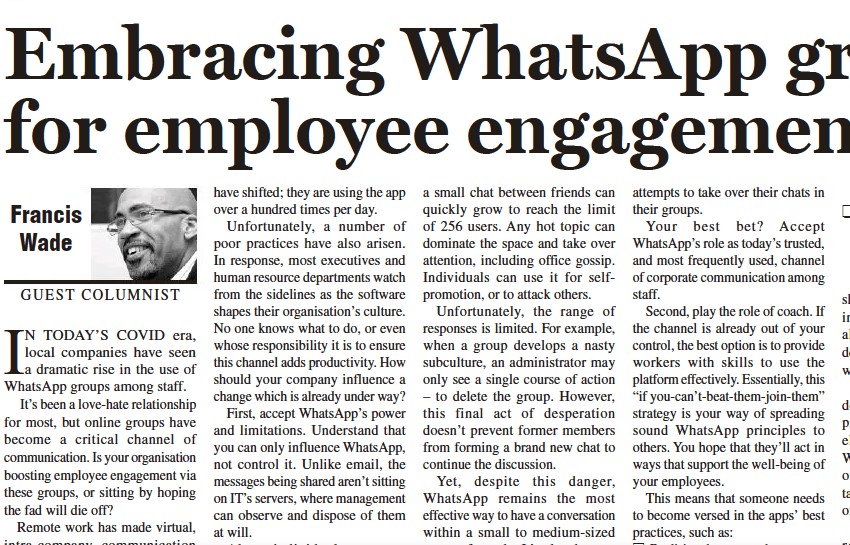In today’s COVID era, local companies have seen a dramatic rise in the use of WhatsApp groups among staff. It’s been a love/hate relationship for most, but online groups have become a critical channel of communication. Is your organization boosting employee engagement via these groups, or sitting by hoping the fad will die off?
Remote work has made virtual, intra-company communication more important than ever. By replacing its digital sibling, email messaging, WhatsApp has become the popular default choice. Now, your official email updates are being ignored. Your employees’ habits have shifted; they are using the app over a hundred times per day.
Unfortunately, a number of poor practices have also arisen. In response, most executives and HR departments watch from the sidelines as the software shapes their organization’s culture. No-one knows what to do, or even whose responsibility it is to ensure this channel adds productivity. How should your company influence a change which is already underway?
- Accept WhatsApp’s power and limitations
Understand that you can only influence WhatsApp, not control it. Unlike email, the messages being shared aren’t sitting on IT’s servers, where management can observe and dispose of them at will.
Also, individual accounts don’t belong to you. Disgruntled ex-employees can continue their hourly gripe sessions with key workers for months to come.
As such, WhatsApp groups have a life of their own. For example, a small chat between friends can quickly grow to reach the limit of 256 users. Any hot topic can dominate the space and take over attention, including office gossip. Individuals can use it for self-promotion, or to attack others.
Unfortunately, the range of responses is limited. For example, when a group develops a nasty sub-culture, an administrator may only see a single course of action – to delete the group. However, this final act of desperation doesn’t prevent former members from forming a brand new chat to continue the discussion.
Yet, despite this danger, WhatsApp remains the most effective way to have a conversation within a small to medium-sized group of people. It’s already your employees’ most popular app. Some companies try to counter its power by launching their own app. If you try this tactic, “Good luck!” Be prepared for staff to bypass it. Instead, they’ll discuss your attempts to take over their chats in their groups.
Your best bet? Accept WhatsApp’s role as today’s trusted, and most frequently used, channel of corporate communication between staff.
- Play the Role of Coach
If the channel is already out of your control, the best option is to provide workers with skills to use the platform effectively. Essentially, this “if you-can’t-beat-them-join-them” strategy is your way of spreading sound WhatsApp principles to others. You hope that they’ll act in ways that support the well-being of your employees.
This means that someone needs to become versed in the apps’ best practices, such as:
- realizing that group chats are not the same as individual chats – once the number of participants grows beyond 10, a unique space is created.
- setting up a moderator and establishing guidelines or rules of engagement.
- developing a strategy for large groups, such as splitting it when the number of members reaches 100.
Where do these come from? This short list is based on my experience in regional WhatsApp groups of all sizes. Your company needs to develop its own insights in keeping with your policies and strategy.
The sad fact is, most companies don’t train their employees to be productive in either meetings or electronic messages (email and WhatsApp). The net effect? A ton of waste, even as these activities take up a reported 25-50% of employee time.
- Encourage Exception Reporting
Unfortunately, WhatsApp’s design encourages users to think of themselves as individuals, not corporate citizens. Therefore, they act in their own interests, first and foremost.
However, there’s another dimension which you must consider: the impact of online discussions on the entire staff. For example, when an employee quits, but doesn’t exit a WhatsApp group discussing sensitive company matters, everyone is affected.
Your organization should act to introduce this broader perspective.
In cyber-space, employees need to ask a new question: “What is best for all concerned?” In this context, someone can act to protect a fellow employee, a department or their entire company by intervening and alerting others when trouble is brewing.
The truth is, these are uncharted waters. Executives who ignore the powerful immediacy of WhatsApp Group communication are putting their heads in the sand, hoping it will go away. It won’t. Gear yourself and your staff for the new reality of remote work dominated by digital messaging at scale.
Francis Wade is the author of Perfect Time-Based Productivity, a keynote speaker and a management consultant. To search prior columns on productivity, strategy, engagement and business processes, send email to columns@fwconsulting.com.

